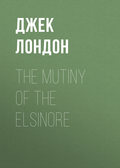
Джек Лондон
John Barleycorn
Work! More than once I sank down on the coal where no one could see me, and cried with rage, and mortification, and exhaustion, and despair. That second day was my hardest, and all that enabled me to survive it and get in the last of the night coal at the end of thirteen hours was the day fireman, who bound both my wrists with broad leather straps. So tightly were they buckled that they were like slightly flexible plaster casts. They took the stresses and pressures which hitherto had been borne by my wrists, and they were so tight that there was no room for the inflammation to rise in the sprains.
And in this fashion I continued to learn to be an electrician. Night after night I limped home, fell asleep before I could eat my supper, and was helped into bed and undressed. Morning after morning, always with huger lunches in my dinner pail, I limped out of the house on my way to work.
I no longer read my library books. I made no dates with the girls. I was a proper work beast. I worked, and ate, and slept, while my mind slept all the time. The whole thing was a nightmare. I worked every day, including Sunday, and I looked far ahead to my one day off at the end of a month, resolved to lie abed all that day and just sleep and rest up.
The strangest part of this experience was that I never took a drink nor thought of taking a drink. Yet I knew that men under hard pressure almost invariably drank. I had seen them do it, and in the past had often done it myself. But so sheerly non-alcoholic was I that it never entered my mind that a drink might be good for me. I instance this to show how entirely lacking from my make-up was any predisposition toward alcohol. And the point of this instance is that later on, after more years had passed, contact with John Barleycorn at last did induce in me the alcoholic desire.
I had often noticed the day fireman staring at me in a curious way. At last, one day, he spoke. He began by swearing me to secrecy. He had been warned by the superintendent not to tell me, and in telling me he was risking his job. He told me of the day coal-passer and the night coal-passer, and of the wages they had received. I was doing for thirty dollars a month what they had received eighty dollars for doing. He would have told me sooner, the fireman said, had he not been so certain that I would break down under the work and quit. As it was, I was killing myself, and all to no good purpose. I was merely cheapening the price of labour, he argued, and keeping two men out of a job.
Being an American boy, and a proud American boy, I did not immediately quit. This was foolish of me, I know; but I resolved to continue the work long enough to prove to the superintendent that I could do it without breaking down. Then I would quit, and he would realise what a fine young fellow he had lost.
All of which I faithfully and foolishly did. I worked on until the time came when I got in the last of the night coal by six o'clock. Then I quit the job of learning electricity by doing more than two men's work for a boy's wages, went home, and proceeded to sleep the clock around.
Fortunately, I had not stayed by the job long enough to injure myself-though I was compelled to wear straps on my wrists for a year afterward. But the effect of this work orgy in which I had indulged was to sicken me with work. I just wouldn't work. The thought of work was repulsive. I didn't care if I never settled down. Learning a trade could go hang. It was a whole lot better to royster and frolic over the world in the way I had previously done. So I headed out on the adventure-path again, starting to tramp East by beating my way on the railroads.
CHAPTER XXI
But behold! As soon as I went out on the adventure-path I met John Barleycorn again. I moved through a world of strangers, and the act of drinking together made one acquainted with men and opened the way to adventures. It might be in a saloon with jingled townsmen, or with a genial railroad man well lighted up and armed with pocket flasks, or with a bunch of alki stiffs in a hang-out. Yes; and it might be in a prohibition state, such as Iowa was in 1894, when I wandered up the main street of Des Moines and was variously invited by strangers into various blind pigs-I remember drinking in barber-shops, plumbing establishments, and furniture stores.
Always it was John Barleycorn. Even a tramp, in those halcyon days, could get most frequently drunk. I remember, inside the prison at Buffalo, how some of us got magnificently jingled, and how, on the streets of Buffalo after our release, another jingle was financed with pennies begged on the main-drag.
I had no call for alcohol, but when I was with those who drank, I drank with them. I insisted on travelling or loafing with the livest, keenest men, and it was just these live, keen ones that did most of the drinking. They were the more comradely men, the more venturous, the more individual. Perhaps it was too much temperament that made them turn from the commonplace and humdrum to find relief in the lying and fantastic sureties of John Barleycorn. Be that as it may, the men I liked best, desired most to be with, were invariably to be found in John Barleycorn's company.
In the course of my tramping over the United States I achieved a new concept. As a tramp, I was behind the scenes of society-aye, and down in the cellar. I could watch the machinery work. I saw the wheels of the social machine go around, and I learned that the dignity of manual labour wasn't what I had been told it was by the teachers, preachers, and politicians. The men without trades were helpless cattle. If one learned a trade, he was compelled to belong to a union in order to work at his trade. And his union was compelled to bully and slug the employers' unions in order to hold up wages or hold down hours. The employers' unions like-wise bullied and slugged. I couldn't see any dignity at all. And when a workman got old, or had an accident, he was thrown into the scrap-heap like any worn-out machine. I saw too many of this sort who were making anything but dignified ends of life.
So my new concept was that manual labour was undignified, and that it didn't pay. No trade for me, was my decision, and no superintendent's daughters. And no criminality, I also decided. That would be almost as disastrous as to be a labourer. Brains paid, not brawn, and I resolved never again to offer my muscles for sale in the brawn market. Brain, and brain only, would I sell.
I returned to California with the firm intention of developing my brain. This meant school education. I had gone through the grammar school long ago, so I entered the Oakland High School. To pay my way I worked as a janitor. My sister helped me, too; and I was not above mowing anybody's lawn or taking up and beating carpets when I had half a day to spare. I was working to get away from work, and I buckled down to it with a grim realisation of the paradox.
Boy and girl love was left behind, and, along with it, Haydee and Louis Shattuck, and the early evening strolls. I hadn't the time. I joined the Henry Clay Debating Society. I was received into the homes of some of the members, where I met nice girls whose skirts reached the ground. I dallied with little home clubs wherein we discussed poetry and art and the nuances of grammar. I joined the socialist local where we studied and orated political economy, philosophy, and politics. I kept half a dozen membership cards working in the free library and did an immense amount of collateral reading.
And for a year and a half on end I never took a drink, nor thought of taking a drink. I hadn't the time, and I certainly did not have the inclination. Between my janitor-work, my studies, and innocent amusements such as chess, I hadn't a moment to spare. I was discovering a new world, and such was the passion of my exploration that the old world of John Barleycorn held no inducements for me.
Come to think of it, I did enter a saloon. I went to see Johnny Heinhold in the Last Chance, and I went to borrow money. And right here is another phase of John Barleycorn. Saloon-keepers are notoriously good fellows. On an average they perform vastly greater generosities than do business men. When I simply had to have ten dollars, desperate, with no place to turn, I went to Johnny Heinhold. Several years had passed since I had been in his place or spent a cent across his bar. And when I went to borrow the ten dollars I didn't buy a drink, either. And Johnny Heinhold let me have the ten dollars without security or interest.
More than once, in the brief days of my struggle for an education, I went to Johnny Heinhold to borrow money. When I entered the university, I borrowed forty dollars from him, without interest, without security, without buying a drink. And yet-and here is the point, the custom, and the code-in the days of my prosperity, after the lapse of years, I have gone out of my way by many a long block to spend across Johnny Heinhold's bar deferred interest on the various loans. Not that Johnny Heinhold asked me to do it, or expected me to do it. I did it, as I have said, in obedience to the code I had learned along with all the other things connected with John Barleycorn. In distress, when a man has no other place to turn, when he hasn't the slightest bit of security which a savage-hearted pawn-broker would consider, he can go to some saloon-keeper he knows. Gratitude is inherently human. When the man so helped has money again, depend upon it that a portion will be spent across the bar of the saloon-keeper who befriended him.
Why, I recollect the early days of my writing career, when the small sums of money I earned from the magazines came with tragic irregularity, while at the same time I was staggering along with a growing family-a wife, children, a mother, a nephew, and my Mammy Jennie and her old husband fallen on evil days. There were two places at which I could borrow money; a barber shop and a saloon. The barber charged me five per cent. per month in advance. That is to say, when I borrowed one hundred dollars, he handed me ninety-five. The other five dollars he retained as advance interest for the first month. And on the second month I paid him five dollars more, and continued so to do each month until I made a ten strike with the editors and lifted the loan.
The other place to which I came in trouble was the saloon. This saloon-keeper I had known by sight for a couple of years. I had never spent my money in his saloon, and even when I borrowed from him I didn't spend any money. Yet never did he refuse me any sum I asked of him. Unfortunately, before I became prosperous, he moved away to another city. And to this day I regret that he is gone. It is the code I have learned. The right thing to do, and the thing I'd do right now did I know where he is, would be to drop in on occasion and spend a few dollars across his bar for old sake's sake and gratitude.
This is not to exalt saloon-keepers. I have written it to exalt the power of John Barleycorn and to illustrate one more of the myriad ways by which a man is brought in contact with John Barleycorn until in the end he finds he cannot get along without him.
But to return to the run of my narrative. Away from the adventure-path, up to my ears in study, every moment occupied, I lived oblivious to John Barleycorn's existence. Nobody about me drank. If any had drunk, and had they offered it to me, I surely would have drunk. As it was, when I had spare moments I spent them playing chess, or going with nice girls who were themselves students, or in riding a bicycle whenever I was fortunate enough to have it out of the pawnbroker's possession.
What I am insisting upon all the time is this: in me was not the slightest trace of alcoholic desire, and this despite the long and severe apprenticeship I had served under John Barleycorn. I had come back from the other side of life to be delighted with this Arcadian simplicity of student youths and student maidens. Also, I had found my way into the realm of the mind, and I was intellectually intoxicated. (Alas! as I was to learn at a later period, intellectual intoxication too, has its katzenjammer.)
CHAPTER XXII
Three years was the time required to go through the high school. I grew impatient. Also, my schooling was becoming financially impossible. At such rate I could not last out, and I did greatly want to go to the state university. When I had done a year of high school, I decided to attempt a short cut. I borrowed the money and paid to enter the senior class of a "cramming joint" or academy. I was scheduled to graduate right into the university at the end of four months, thus saving two years.
And how I did cram! I had two years' new work to do in a third of a year. For five weeks I crammed, until simultaneous quadratic equations and chemical formulas fairly oozed from my ears. And then the master of the academy took me aside. He was very sorry, but he was compelled to give me back my tuition fee and to ask me to leave the school. It wasn't a matter of scholarship. I stood well in my classes, and did he graduate me into the university he was confident that in that institution I would continue to stand well. The trouble was that tongues were gossiping about my case. What! In four months accomplished two years' work! It would be a scandal, and the universities were becoming severer in their treatment of accredited prep schools. He couldn't afford such a scandal, therefore I must gracefully depart.
I did. And I paid back the borrowed money, and gritted my teeth, and started to cram by myself. There were three months yet before the university entrance examinations. Without laboratories, without coaching, sitting in my bedroom, I proceeded to compress that two years' work into three months and to keep reviewed on the previous year's work.
Nineteen hours a day I studied. For three months I kept this pace, only breaking it on several occasions. My body grew weary, my mind grew weary, but I stayed with it. My eyes grew weary and began to twitch, but they did not break down. Perhaps, toward the last, I got a bit dotty. I know that at the time I was confident, I had discovered the formula for squaring the circle; but I resolutely deferred the working of it out until after the examinations. Then I would show them.
Came the several days of the examinations, during which time I scarcely closed my eyes in sleep, devoting every moment to cramming and reviewing. And when I turned in my last examination paper I was in full possession of a splendid case of brain-fag. I didn't want to see a book. I didn't want to think or to lay eyes on anybody who was liable to think.
There was but one prescription for such a condition, and I gave it to myself-the adventure-path. I didn't wait to learn the result of my examinations. I stowed a roll of blankets and some cold food into a borrowed whitehall boat and set sail. Out of the Oakland Estuary I drifted on the last of an early morning ebb, caught the first of the flood up bay, and raced along with a spanking breeze. San Pablo Bay was smoking, and the Carquinez Straits off the Selby Smelter were smoking, as I picked up ahead and left astern the old landmarks I had first learned with Nelson in the unreefer Reindeer.
Benicia showed before me. I opened the bight of Turner's Shipyard, rounded the Solano wharf, and surged along abreast of the patch of tules and the clustering fishermen's arks where in the old days I had lived and drunk deep.
And right here something happened to me, the gravity of which I never dreamed for many a long year to come. I had had no intention of stopping at Benicia. The tide favoured, the wind was fair and howling-glorious sailing for a sailor. Bull Head and Army Points showed ahead, marking the entrance to Suisun Bay which I knew was smoking. And yet, when I laid eyes on those fishing arks lying in the water-front tules, without debate, on the instant, I put down my tiller, came in on the sheet, and headed for the shore. On the instant, out of the profound of my brain-fag, I knew what I wanted. I wanted to drink. I wanted to get drunk.
The call was imperative. There was no uncertainty about it. More than anything else in the world, my frayed and frazzled mind wanted surcease from weariness in the way it knew surcease would come. And right here is the point. For the first time in my life I consciously, deliberately, desired to get drunk. It was a new, a totally different manifestation of John Barleycorn's power. It was not a body need for alcohol. It was a mental desire. My over-worked and jaded mind wanted to forget.
And here the point is drawn to its sharpest. Granted my prodigious brain-fag, nevertheless, had I never drunk in the past, the thought would never have entered my mind to get drunk now. Beginning with physical intolerance for alcohol, for years drinking only for the sake of comradeship and because alcohol was everywhere on the adventure-path, I had now reached the stage where my brain cried out, not merely for a drink, but for a drunk. And had I not been so long used to alcohol, my brain would not have so cried out. I should have sailed on past Bull Head, and in the smoking white of Suisun Bay, and in the wine of wind that filled my sail and poured through me, I should have forgotten my weary brain and rested and refreshed it.
So I sailed in to shore, made all fast, and hurried up among the arks. Charley Le Grant fell on my neck. His wife, Lizzie, folded me to her capacious breast. Billy Murphy, and Joe Lloyd, and all the survivors of the old guard, got around me and their arms around me. Charley seized the can and started for Jorgensen's saloon across the railroad tracks. That meant beer. I wanted whisky, so I called after him to bring a flask.
Many times that flask journeyed across the railroad tracks and back. More old friends of the old free and easy times dropped in, fishermen, Greeks, and Russians, and French. They took turns in treating, and treated all around in turn again. They came and went, but I stayed on and drank with all. I guzzled. I swilled. I ran the liquor down and joyed as the maggots mounted in my brain.
And Clam came in, Nelson's partner before me, handsome as ever, but more reckless, half insane, burning himself out with whisky. He had just had a quarrel with his partner on the sloop Gazelle, and knives had been drawn, and blows struck, and he was bent on maddening the fever of the memory with more whisky. And while we downed it, we remembered Nelson and that he had stretched out his great shoulders for the last long sleep in this very town of Benicia; and we wept over the memory of him, and remembered only the good things of him, and sent out the flask to be filled and drank again.
They wanted me to stay over, but through the open door I could see the brave wind on the water, and my ears were filled with the roar of it. And while I forgot that I had plunged into the books nineteen hours a day for three solid months, Charley Le Grant shifted my outfit into a big Columbia River salmon boat. He added charcoal and a fisherman's brazier, a coffee pot and frying pan, and the coffee and the meat, and a black bass fresh from the water that day.
They had to help me down the rickety wharf and into the salmon boat. Likewise they stretched my boom and sprit until the sail set like a board. Some feared to set the sprit; but I insisted, and Charley had no doubts. He knew me of old, and knew that I could sail as long as I could see. They cast off my painter. I put the tiller up, filled away before it, and with dizzy eyes checked and steadied the boat on her course and waved farewell.
The tide had turned, and the fierce ebb, running in the teeth of a fiercer wind, kicked up a stiff, upstanding sea. Suisun Bay was white with wrath and sea-lump. But a salmon boat can sail, and I knew how to sail a salmon boat. So I drove her into it, and through it, and across, and maundered aloud and chanted my disdain for all the books and schools. Cresting seas filled me a foot or so with water, but I laughed at it sloshing about my feet, and chanted my disdain for the wind and the water. I hailed myself a master of life, riding on the back of the unleashed elements, and John Barleycorn rode with me. Amid dissertations on mathematics and philosophy and spoutings and quotations, I sang all the old songs learned in the days when I went from the cannery to the oyster boats to be a pirate-such songs as: "Black Lulu," "Flying Cloud," "Treat my Daughter Kind-i-ly," "The Boston Burglar," "Come all you Rambling, Gambling Men," "I Wisht I was a Little Bird," "Shenandoah," and "Ranzo, Boys, Ranzo."
Hours afterward, in the fires of sunset, where the Sacramento and the San Joaquin tumble their muddy floods together, I took the New York Cut-Off, skimmed across the smooth land-locked water past Black Diamond, on into the San Joaquin, and on to Antioch, where, somewhat sobered and magnificently hungry, I laid alongside a big potato sloop that had a familiar rig. Here were old friends aboard, who fried my black bass in olive oil. Then, too, there was a meaty fisherman's stew, delicious with garlic, and crusty Italian bread without butter, and all washed down with pint mugs of thick and heady claret.
My salmon boat was a-soak, but in the snug cabin of the sloop dry blankets and a dry bunk were mine; and we lay and smoked and yarned of old days, while overhead the wind screamed through the rigging and taut halyards drummed against the mast.







